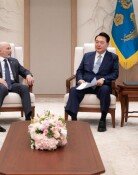Seoul’s untimely offer to hold summit, ease sanctions
Seoul’s untimely offer to hold summit, ease sanctions
Posted May. 23, 2017 06:16,
Updated May. 23, 2017 06:18
The Unification Ministry said on Monday “The ministry will continue to flexibly consider key issues in inter-Korean relations including civilian exchanges,” indicating its plan to allow South Korean civilian organizations to contact North Korea to provide humanitarian assistance. The ministry put the condition suggesting “as long as the contact will not violate the international community’s sanctions against North Korea,” but the offer means that Seoul will effectively lift the May 24 (2010) measure banning personnel and material exchange between the two Koreas following the North’s torpedo attack that sank the South Korean naval corvette Cheonan in 2010. The Moon Jae-in administration has made official its purported policy of engagement with the North in less than a day after the North’s provocation with a new type of missile, particularly at a time when the international community is poised to increase pressure on Pyongyang.
Bragging about the successful launch of its ballistic missile Pukguksong-2 on Sunday, the North threatened that more of the so-called Juche-tan (missile) will blast off targeting the U.S. The Pukguksong-2 is a Medium-range ballistic missile that poses threat even to the U.S. airbases in Japan and Guam where the U.S. military’s strategic weapons will depart to back up U.S. troops in the event of armed conflict on the Korean Peninsula. The U.S. made it clear that it will impose additional sanctions and add pressure on the North based on its judgement that it is now only a matter time before Pyongyang completes an intercontinental ballistic missile. The U.N. Security Council will also hold an emergency meeting to discuss additional sanctions against Pyongyang.
Even if the new South Korean administration seeks to inherit the sunshine policy of engaging the North from the Kim Dae-jung and Roh Moo-hyun administrations, it is not desirable for the new government to raise voice that runs counter to such mood in the international community. Even so, Chung Ui-yong, head of the presidential National Security Office, visited the National Assembly on Monday and said, “We will recover the phase of dialogue (with Pyongyang) aimed at helping ease tension on the Korean Peninsula at an earliest date.” Moon Jung-in, special advisor on unification, foreign affairs and national security for President Moon, also told a media interview, “We hope to see the day when President Moon Jae-in will hold a third summit with the North Korean leader sooner than later,” after writing in an newspaper editorial reading that “I think it is not necessary for Seoul to have any conditions or win consent from Washington in the effort to figure out the North’s intention through behind-the-scene exchange between civilian organizations and make preparations to hold bilateral talks between the authorities at an early date.”
Over the past several months, the international community, with the U.S. as the focal point, has been sternly responding to the North’s nuclear and missile provocations. Notably, the U.S. and China have collaborated to sanction the North, which provides an unprecedented opportunity. If Seoul sends an ill-advised signal that it will lift even the existing sanctions by calling for "dialogue first" amid this situation, the Moon administration could soon become a reliable party to the North, and Pyongyang will become more aggressive in making risky provocations. This comes amid criticism and concern that Moon’s new foreign affairs and national security team is lacking a senior official armed with courage and boldness to take responsibility for the North’s nuclear weapons and the South’s national security. Seoul cannot afford to make the grave mistake of a "second Korea passing" in which it loses trust from the international community and allows other parties to bypass Korea in conversations addressing the Korean Peninsula.
klimt@donga.com







